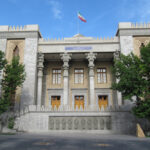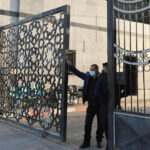Spain’s world-famous opera singer Montserrat Caballe, known for her velvet-edged voice and radical rock duet with Queen singer Freddie Mercury, died in Barcelona on Saturday at the age of 85.
Hailed as one of the world’s greatest singers for her vocal virtuosity and dramatic powers, Caballe charmed audiences for half a century with a huge repertoire that saw her perform across the globe.
The Spanish soprano was already considered an opera great when her duet with Mercury, a boundary-busting combination of opera and rock, became the anthem for the 1992 Olympic Games and propelled her into the mainstream.
Retired for several years because of health problems, the soprano was hospitalised in mid-September due to a gall bladder problem, local media reported.
“She died overnight at the Sant Pau hospital,” a hospital source told AFP.
A service for the singer will be held on Sunday at 1200 GMT, with a funeral the following day, Barcelona authorities said.
“Montserrat Caballe, her voice and her tenderness, will always stay with us,” said Spanish leader Pedro Sanchez on Twitter.
He said the country had lost “a great ambassador of our country, a soprano recognised internationally”.
Born in April 1933 to a humble family in Barcelona, Maria de Montserrat Viviana Concepcion Caballe i Folch studied music at the Liceu Conservatory in the Catalan capital.
But her families financial troubles almost derailed her budding career, forcing her to briefly abandon her studies until a patron stepped in to help her.
After making her debut in Basel in Giacomo Puccini’s “La Boheme” in 1956, she first performed at Barcelona’s Gran Teatre del Liceu in 1962, beginning a decades-long love affair with fans in her home city.
Caballe’s big break came in 1965 when she stepped in for American soprano Marilyn Horne in the notoriously difficult role of Lucrezia Borgia in Donizetti’s opera in New York.
Her spectacular performance went down in opera history as one of the greatest overnight successes.
She went on to tour the world in a career spanning 50 years, garnering international acclaim for her creamy voice and gregarious stage presence.
Her vast repertoire, vocal versatility and mastery of the art of “pianissimo” meant she was as much at home with Rossini and Donizetti as Mozart and Dvorak.
She sang on some of the world’s most prestigious stages, including New York’s Metropolitan Opera House, Milan’s La Scala and the Royal Opera House in London.
Career highlights included a triumphant performance in Bellini’s “Norma” at La Scala in 1972.


Caballe performed with other opera greats like Luciano Pavarotti and Placido Domingo.
But it was with Freddie Mercury that she was able to display her talents to a global mainstream audience, recording an album “Barcelona” with the rock star in the late 1980s.
“For the world of opera it was a revolution, a genuine revolution,” she said, according to a 2003 documentary about her music.
The title duet became the anthem for the 1992 Olympic Games in Barcelona and her performance of the song, without Mercury who had died the previous year, was an electrifying highlight of the opening ceremony.


Caballe was afflicted by a series of health problems during the latter part of her career that made her drastically reduce her performance schedule.
After a long break from the stage she made a rare appearance at the Barcelona opera in 2002 to mark 40 years since her debut at the Gran Teatre del Liceu. Her first entrance was greeted with a rapturous ovation lasting more than ten minutes.
Caballe suffered a minor stroke in 2012 and recent years were also notable for a tax evasion investigation that saw her being given a six-month suspended jail term and a fine in 2015.
Caballe’s daughter with her husband Spanish tenor Bernabe Marti whom she married in 1964 is also a soprano.





